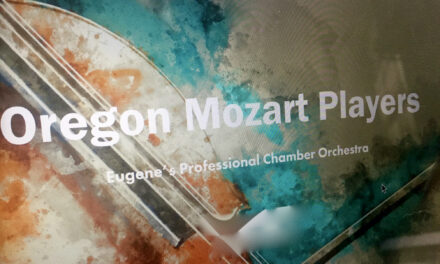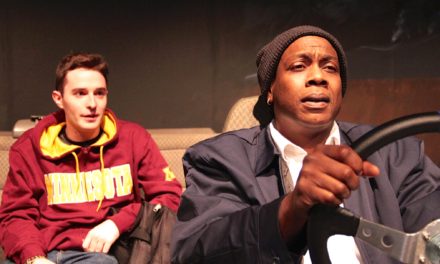By Monique Danziger
Adapted from the 2003 bestselling book of the same name by Mark Haddon, The Curious Incident of the Dog in the Night-Time explores themes of neuro-diversity, family trauma and societal bias through the experiences of its autistic 15-year old protagonist, Christopher Boone. The title is a reference to Sherlock Holmes, whom Boone admires for his emotional detachment and dedication to logic.
Now running at the Oregon Contemporary Theatre, The Curious Incident of the Dog in the Night-Time starts with our protagonist wrongly accused of canicide. That is to say, the play begins with a whodunit mystery about a murdered dog. It goes on to explore far deeper mysteries with the same clear-eyed focus and inventiveness that would make even the great Sherlock Holmes proud.
For starters, there is the mystery of the murdered dog, Wellington. When the lights come up, we see Christopher crouched before the deceased animal while his teacher, Siobhan (the poised and unflappable Allison Mickelson), reads from Christopher’s diary. Things go south quickly from there, with the dog’s distraught owner accusing Christopher of the crime, followed by a tussle with the police.
This sets Christopher on a journey to discover the identity of the canine killer. This is no small task for a young man who struggles to navigate human interactions such as basic conversations or the simple act of a handshake — Christopher cannot lie, hates metaphors (because they are confusing) and cannot stand being touched.
Part of the genius of this show is how it brings the audience into Christopher’s world. The sensory overload, the strangeness of human nature and the exceptional beauty of life when observed so fully, are all brought to life through a combination of choreography and multi-media stagecraft.
Under the meticulous direction of OCT veteran John Schmor, The Curious Incident of the Dog in the Night-Time is trimmed down to its essential elements. There is still plenty to marvel at, but there is more room for the cast to shine. The production also feels perfectly at home in the intimate black box theater that is OCT. There’s the perfect amount of space to take in each clever detail while the large performances pack more of a wallop when delivered in such close range.
As a newcomer to the OCT stage, Nate Pereira’s portrayal of Christopher is a heart-wrenching combination of vulnerability and resolve. It is an extremely physical part with a large amount of complex dialogue that requires total commitment. Nate fully inhabits the fidgety body and exceptional mind of Christopher without missing a beat.
Paul Dunckel brings a realistic edge and essential empathy to the role of Christopher’s dad, Ed, while Inga R. Wilson delivers a raw and beautiful performance as Christopher’s mother, Delia. These characters are complicated, likable and unlikable all at once and Dunckel and Wilson do not disappoint in bringing them to life.
It is worth noting how seasoned the entire cast of this show is. This includes the six-person ensemble cast of Donella-Elizabeth Alston, Kelly Oristano, Joel Ibañez, Tony Stirpe, Erica Towe and Tinamarie Ivey. This team is part set design, part Greek chorus and best of all, a rotating cast of characters that color Christopher’s world. From the nosy neighbor (the always delightful Ivey) to the confounded policeman (a hilarious Ibañez)—there is a beautiful, dance-like flow of human bodies throughout each scene.
There is no shortage of accolades either for the work done on the technical side. While there is plenty of virtuosity in the cast, an electrical train, simulated moon walk and a mathematical problem involving a triangle whose side lengths are equal to n2+1, n2-1, and 2n are all delightful scene stealers.
Many kudos go to the show’s production team, including sound and projection designer Ryan Rusby, whose innovations involving projections, graphic design and sound create some of the show’s best moments. There is also a prop-focused reveal at the end that elicited gasps of delight from the audience.
Sir Arthur Conan Doyle, in his Sherlock Holmes mysteries, once wrote, “Education never ends, Watson. It is a series of lessons, with the greatest for the last.” After playing detective, uncovering a very large lie, journeying into London and taking the oft-vaunted “A-Level Maths,” Christopher reflects on his experiences. He concludes that he has been quite brave and that if he is brave, he can do anything.
Elementary, my dear Watson.
The Curious Incident of the Dog in the Night-Time
When: Evenings at 7:30 p.m. on Jan. 18, 23-25, 30-31, and Feb. 1, 6-8; matinees at 2 p.m. on Jan. 26 and Feb. 2
Where: Oregon Contemporary Theatre, 194 W. Broadway, Eugene
Tickets: $20, $32, $42, available at the box office, 541-465-1506, or online at octheatre.org
Information: 541-684-6988 or octheatre.org









